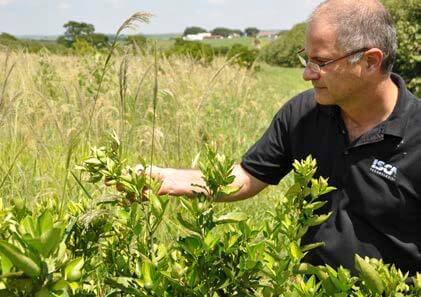

The story of ISCA Global, headquartered in Riverside, California, dates back to 2019. The birth of the company is the result of operations in Brazil (ISCA Tecnologias Ltda.) and the United States (ISCA Technologies, Inc.) and agreements with pheromone suppliers on a global scale. It was precisely the union of the two companies that could enable the use of semiochemicals in agriculture, when they added qualities in products, synthesis and market favorable to the growth of the industry.
THE BEGINNING
It was in the late 1980s when the Brazilian biologist Agenor Mafra Neto decided to move to the United States in order to deepen his research on the chemical communication of insects and their behavior in agriculture, a great passion of his academic life. He graduated from the University of Campinas, one of the most prestigious universities in Latin America, and received his master′s degree from the same university. He then dedicated himself to doctoral studies at the University of Massachusetts and postdoctoral studies at Iowa State University. In the middle of this trajectory, in 1994, he gained projection among entomologists when he published an article in Nature, one of the most important scientific journals in the world, on the influence of pheromones in the flight of moths.
With a successful academic career, a respected researcher among insects′ scholars, Agenor decided that this would be a good time to transform his knowledge into solutions that would help farmers who suffered from agricultural pests. After some conversations, in 1996, the couple Ben-Hur Lenz César Mafra and Ingeborg Jost Mafra accepted their son′s scientist challenge. They created ISCA simultaneously in the United States and in Brazil. ISCA Technologies was the first semiochemical company in Latin America, based in the Mafra family′s hometown of Ijuí, Rio Grande do Sul. The three would soon be joined by the fourth member of the family, Agenor′s brother Leandro Mafra.
The first action was to create solutions for the apple producers, who faced great challenges to meet the foreign orders in those 1990s. At the same time that they needed to control pests, they were pressured to reduce the use of insecticides, which left residues in the fruit. Concern for nature and the environment has always been fundamental to the Mafra way of life.
After planning what they would do, Ingeborg, Ben-Hur and Agenor moved on to practical matters. They created the products and ISCA started offering its line of pheromones at affordable prices, making the implementation of integrated pest management programs feasible. Soon after, producers of other fruits surrendered to the advantages of using semiochemicals to control insects.

With a successful academic career and respected as a researcher among insects` scholars, Agenor Mafra-Neto decided that this would be a good time to transform his knowledge into solutions that would help farmers suffering agricultural pests. Thus ISCA was born.
One of the company′s greatest assets was precisely the North American arm, led by Agenor. ISCA laboratories, since the beginning, have been known for developing innovative research in the field of semiochemicals. It was no coincidence that in 20 years it raised US$ 40 million in subsidies from various entities, such as the Gates Foundation, the US government, and universities in the United States and Europe. In this way ISCA developed products that today reach extensive crops such as cotton, corn, and soybeans.
Over the years since then, ISCA′s portfolio has expanded to include cotton, corn, and soybeans, the major agricultural commodities. The company has launched numerous solutions against insects such as Helicoverpa armigera, the enemy of soybean, cotton, and corn crops, the corn earworm (Helicoverpa zea), Spodoptera frugiperda, and is still in the development phase of products for other insects, such as the soybean stink bug (Euschistus heros).
The company has conquered markets in America, Europe, North Africa, and Asia. With the expansion of the business, it was necessary to increase the scale of production. The group grew and gained capacity to meet the growing demand from producers in various sectors of agriculture, interested in reducing the use of pesticides and meeting the consumer of the 21st century, increasingly concerned with health and environmental preservation.